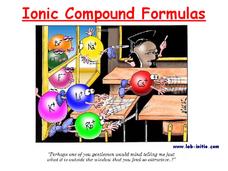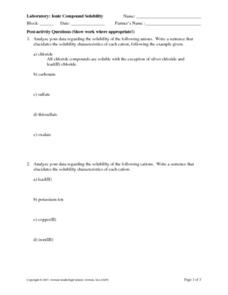Science Geek
Ionic Compound Formulas
By contrasting cations and anions, this presentation shows how to predict ionic charges by periodic groups. The slides conclude with a few guided practice problems for writing ionic compound formulas.
Science Geek
Ionic Bonding
Here's a presentation that answers the age-old question of the covalent bond to the ionic bond, "Why won't you share?" Included is information about covalent and ionic bonds, the octet rule, ionic compounds, cations versus anions, and...
Curated OER
Cations and Anions
For this cations and anions worksheet, students complete 2 graphic organizers by filling in the name or formula for each cation and the name or formula for each anion.
Curated OER
What Happens When Chemicals Are Put Together?
In this compounds worksheet, students write the chemical formulas for ionic compounds given cations and anions. They are also given cations and anions and identify the number of cations and anions needed to write the...
Curated OER
What Happens When Chemicals are Put Together?
In this ionic compounds worksheet, students complete two tables with the chemical formulas given the cations and anions that bond.
Creative Chemistry
Common Ions and Formulae of Ionic Compounds
This handout, produced in the UK, contains a chart of cations and anions. It explains how ionic compounds are formed and named. This concise and attractive handout can be helpful as a reference for your chemistry apprentices.
Curated OER
Binary Compounds
Binary compounds are explained with the periodic table, atomic charges, and examples. Viewers are taught to name binary compounds and then are presented with a chart of cations and ions. Finally, they see a few photos of forms of silicon...
Creative Chemistry
Common Ions and Formulae of Ionic Compounds
This is not a learning exercise per se but a reference sheet for your chemistry class. It lists cations and anions, their chemical symbols, and their net charges. Also included is a thorough explanation of combining these ions to form...
Curated OER
Review of Ionic and Covalent Compounds and Transitioning from Ionic to Covalent Compounds
Here is a unique assigment: compare and contrast ionic and covalent compounds in an extensive data table and then analyze Lewis dot structures in antoher. Three columns are to befilled in: "characteristic or feature," "applies to ionic...
Curated OER
What Happens When Chemicals Are Mixed Together?
In this naming acids instructional activity, students are given names of anions and they write the anion symbols. Students then write the formula and name of each acid.
Curated OER
Laboratory: Ionic Compound Solubility
In this solubility worksheet, students answer post activity questions about the lab work they completed with ionic compounds. They write sentences about solubility of cations from their lab work. They write chemical reactions for their...
Curated OER
Transition Metals
In this transition metals worksheet, students fill in a table given a metal compound with the charges of the anion and cation. They then determine the name of the compounds.
Curated OER
Transition Metals 2
In this transition metals worksheet, students name thirty one metal compounds by determining the charges on the anion and cation and writing their chemical formulas.
Curated OER
Nomenclature
In this nomenclature worksheet, learners complete a graphic organizer by filling in the formula, cation, anion, and name of the given compounds.
Curated OER
Science Puzzlers, Twisters, and Teasers: Chemical Bonding
What a cute approach to chemical bonding! Atoms all have human names and are attending at a dance. Who will pair up with whom? By reading the characteristics, and not the element name, chemistry whizzes figure out the bonding pairs....
Curated OER
AP: Chapter 36: Transport in Plants
When you need a review worksheet for your AP biologists on water and nutrient transport in plants, this one is for you! From the simple stuctures involved to the complex mechanisms that make it happen, the details of transport are...
Curated OER
Chapter 14 Review, Section 2: Acids and Bases
Lewis acids and bases, Brønsted-Lowry acids and bases, ionization, and more are covered by this chemistry handout. It serves as a review of a specific textbook section, but will also serve as a nice review for any general chemistry...
Curated OER
Clever Characters for Oxidation and Reduction Concepts
This PowerPoint presents five graphics for helping chemistry scholars to remember the basics of general oxidation and reduction. You will find clever characters, such as An ox to explain that an anode is where oxidation occurs. The...
Curated OER
Naming Inorganic Compounds
In this compounds worksheet, students review how to name inorganic compounds and then complete 2 graphic organizers naming the cations and anions.
Curated OER
Writing Formulas for Ionic Compounds
In this writing formulas worksheet, students write the formulas for 15 ionic compounds and name their anions and cations. Students balance the charges of the ions to determine the formula.
Curated OER
Writing Formulas for Ionic Compounds with Complex Ions
In this writing formulas worksheet, students write the formulas for 15 complex ionic compounds and name their anions and cations. Students must balance the charges on the ions and determine the formula.
Curated OER
Vocabulary - Unit 5, Chemical Bonds
All you will find in this resource is a list of vocabulary terms dealing with chemical bonds. Space is provided for chemistry learners to write out definitions. This would be a terrific tool to help prepare them for a quiz.
Curated OER
Acids, The Basics: What are They and How Do We Name Them?
What acids are and how they are named are the main topics approached in this slide show. Explore the definitions and behavior of acids, along with directions for naming and writing reactions. The last slide has some practice...
Curated OER
Predicting the pH of Salt Solutions
A single page provides you with lecture notes for your lesson on hydrolysis. Introduce your chemistry class to Bronsted-Lowry theory by explaining the hydrolysis of acidic cations and basic anions. Show them how the resulting pH can be...

























